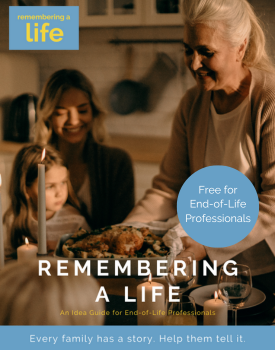An Interview with Dr. Sara Murphy About Responding to Loss During the COVID-19 Pandemic
Gabe Shauf, a licensed funeral director and funeral service educator, recently sat down with Dr. Sara Murphy, a death educator, certified thanatologist and suicidologist to discuss the realities of grief during the pandemic. Sara is a contributing writer to the Remembering A Life blog and author of the booklet, "Grieving Alone and Together Responding to the Loss of your Loved One during the COVID-19 Pandemic", which is available for free in the Remembering A Life Store.
The following interview is an excerpt from the “A Brush with Death” podcast created by the National Funeral Directors Association for the funeral service profession. You may also listen to the audio recording via the play button below.
Gabe Schauf: How has coronavirus impacted grief?
Sara Murphy: Yeah. I mean, not to throw it right back, but how hasn't coronavirus impacted grief? We're seeing grieving on a scale that we've never seen before, at least not in the last century, so people are individually grieving at the same time that we're experiencing cultural grieving and cultural fear and cultural panic, and that absolutely will change the way in which we think about our private experiences with grief, because there is no escaping grief around us, whether it's media, friends, social media, our own grief experiences – which are very unique and very self-directed – aren't always going to be validated personally or interpersonally, so that can make our grief feel much more precious but much more intense at the same time.
Gabe Schauf: And to start out with, it seems that everybody is just, I don't know if "saturated" is the right word or inundated with coronavirus stuff. You turn on the news and it's there; you turn on the radio and it's part of everything that we do, and certainly it's a part of grief. But before we dive into the grief part with the loss, COVID fatigue, what can we say about that?
Sara Murphy: Yeah, I think "saturated" is the right word. It's very hard to escape preoccupation with coronavirus right now. And on one level, that saturation is to be expected and it is ethically responsible that we're getting the information that we need and that the information is clinically accurate at all times. But at the same time, if our day is being built around telecommuting or teaching our kids from home while simultaneously every conversation that we're having is somehow being troubled by or evolving around Coronavirus, there is no escaping it, and that saturation is going to affect our stress levels. It will affect us biologically and psychologically and certainly sociologically – right? – because most of our interactions with people now are being done remotely and yet are being done in ways in which we are discussing constantly, coronavirus updates. So you're right, it's somewhat inescapable right now.
Gabe Schauf: And then on top of that, which is why we're here today, are folks who are going through loss, who have lost somebody. And it doesn't even have to be somebody lost somebody to the Coronavirus or because of Coronavirus; it's even people who have lost loved ones just during this time. How is that affecting the process of grief with those families?
Sara Murphy: Well, grief, as we know, is individually and uniquely experienced. So when someone dies within a family system or within a community, every person is going to have different grief responses – "grief" being our emotional responses to a loss. And that can be tricky to navigate under the best of circumstances, because our grief responses might not look like our sibling or parent or child's grief responses, and it's very important that everyone is supporting each other's unique responses to grief.
When we're talking about loss during a pandemic, a public health crisis, our grief response is – are in a state of a perfect storm right now because you have so many outside factors that are pressing upon the way in which we are allowed to express our grief. We have social isolation, self-quarantining, travel restrictions, separation from co-grievers – whether they're friends or family members – and we also have this culture that is currently steeped in death and dying, which might make the death of our loved one not appear as publicly acknowledged or important as it would in a community at another time.
Gabe Schauf: So does that vary, too, depending on where that person is located? You know, small town versus the big city or, you know, from state to state?
Sara Murphy: I don't know if it's going to vary based on state boundaries, per se, but I think it's going to look different depending on where someone dies or where someone is grieving in terms of the weight or the impact of coronavirus on that community or on that area.
Certainly if you are in New York City right now or New Orleans right now and you lose a loved one, the kind of stress that you may be going through, even trying to put something in place to memorialize your loved one, would look very, very different than if you were in a small town in North Dakota that hasn't been hit as hard.
So there's practical considerations there in terms of epidemiology; but at the same time, all of us are going to the national news, all of us are perceiving the continued threat of the virus, different states are handling things differently right now, but we're not nearly out of the woods yet. So that culture of fear and anticipation of future losses, I think, is going to treble grief wherever someone is living right now.
Gabe Schauf: And something I wanted to ask you with that too, is when grief happens, say in a normal situation when there's not a pandemic going on, there's what, I guess you could say, is a normal reaction to grief. When we're going through grief in this kind of a situation, and this is a good question for funeral directors to look at families or observe from families or even there are people listening to this who are not funeral directors but they are going through this or they have friends going through it, what does grief at this time kind of look like?
Sara Murphy: Yeah. Well, again, the individual grief responses will be unique to each person. We know that there are a lot of different emotions that might be part of someone's grief response: Anger; you know, sadness, depression, loneliness, hopelessness, numbness.
Most of us don't experience all of these emotions after an individual loss, but most of us experience some of them and they may factor differently for different people. But grieving in the times of a pandemic means that we also need to understand palpably that these are traumatic losses as well.
And funeral directors are used to dealing with traumatic loss on a case-by-case basis; right? Whether it is, you know, a horrific car accident or cases of homicide or cases of suicide. They expect there to be some trauma responses in survivors. And the death during a pandemic, regardless of cause, is already going to be traumatic because of the nature of the way that someone died. And by that I don't mean dying of complications of the virus versus dying of something else; but because people are losing loved ones suddenly, people are not able to be with their loved ones while they are dying, certainly not to the degree they would want to be under normative cultural circumstance, and these grief responses, then, become complicated by the traumatic nature of the culture of loss that we are in.
So whereas someone will still have their unique set of grief responses, those may well be exacerbated by the frustration of not feeling that this is something that should have happened or the frustration of not knowing what to do with their grief, what their options are in terms of mourning publicly, but they're also going to experience a lot of the same responses and reactions that would be experienced by other survivors of traumatic loss, whether it's a death loss or non-death loss.


